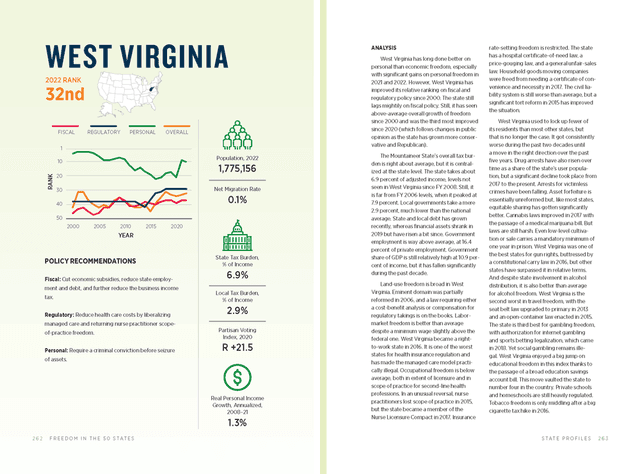Policy Recommendations
- Fiscal Cut economic subsidies, reduce state employment and debt, and further reduce the business income tax.
- Regulatory Reduce health care costs by liberalizing managed care and returning nurse practitioner scope-of-practice freedom.
- Personal Require a criminal conviction before seizure of assets.
Analysis
West Virginia has long done better on personal than economic freedom, especially with significant gains on personal freedom in 2021 and 2022. However, West Virginia has improved its relative ranking on fiscal and regulatory policy since 2000. The state still lags mightily on fiscal policy. Still, it has seen above-average overall growth of freedom since 2000 and was the third most improved since 2020 (which follows changes in public opinion as the state has grown more conservative and Republican).
The Mountain State’s overall tax burden is right about average, but it is centralized at the state level. The state takes about 6.9 percent of adjusted income, levels not seen in West Virginia since FY 2008. Still, it is far from FY 2006 levels, when it peaked at 7.9 percent. Local governments take a mere 2.9 percent, much lower than the national average. State and local debt has grown recently, whereas financial assets shrank in 2019 but have risen a bit since. Government employment is way above average, at 16.4 percent of private employment. Government share of GDP is still relatively high at 10.9 percent of income, but it has fallen significantly during the past decade.
Land-use freedom is broad in West Virginia. Eminent domain was partially reformed in 2006, and a law requiring either a cost-benefit analysis or compensation for regulatory takings is on the books. Labor-market freedom is better than average despite a minimum wage slightly above the federal one. West Virginia became a right-to-work state in 2016. It is one of the worst states for health insurance regulation and has made the managed care model practically illegal. Occupational freedom is below average, both in extent of licensure and in scope of practice for second-line health professions. In an unusual reversal, nurse practitioners lost scope of practice in 2015, but the state became a member of the Nurse Licensure Compact in 2017. Insurance rate-setting freedom is restricted. The state has a hospital certificate-of-need law, a price-gouging law, and a general unfair-sales law. Household goods moving companies were freed from needing a certificate of convenience and necessity in 2017. The civil liability system is still worse than average, but a significant tort reform in 2015 has improved the situation.
West Virginia used to lock up fewer of its residents than most other states, but that is no longer the case. It got consistently worse during the past two decades until a move in the right direction over the past five years. Drug arrests have also risen over time as a share of the state’s user population, but a significant decline took place from 2017 to the present. Arrests for victimless crimes have been falling. Asset forfeiture is essentially unreformed but, like most states, equitable sharing has gotten significantly better. Cannabis laws improved in 2017 with the passage of a medical marijuana bill. But laws are still harsh. Even low-level cultivation or sale carries a mandatory minimum of one year in prison. West Virginia was one of the best states for gun rights, buttressed by a constitutional carry law in 2016, but other states have surpassed it in relative terms. And despite state involvement in alcohol distribution, it is also better than average for alcohol freedom. West Virginia is the second worst in travel freedom, with the seat belt law upgraded to primary in 2013 and an open-container law enacted in 2015. The state is third best for gambling freedom, with authorization for internet gambling and sports betting legalization, which came in 2018. Yet social gambling remains illegal. West Virginia enjoyed a big jump on educational freedom in this index thanks to the passage of a broad education savings account bill. This move vaulted the state to number four in the country. Private schools and homeschools are still heavily regulated. Tobacco freedom is only middling after a big cigarette tax hike in 2016.

